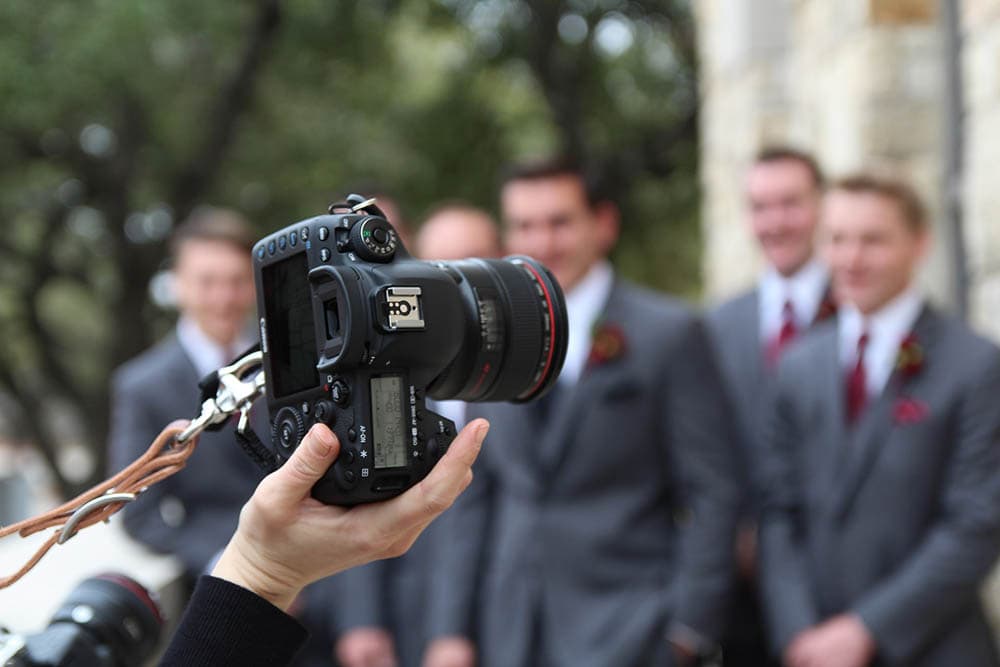How to Become a Wedding Photographer (Step-by-Step Guide)
Last Updated on

There’s something incredible about being able to capture the magical moments of a wedding. Many amateur photographers dream of becoming full-time wedding photographers. And it’s not hard to do; it just takes some planning and work.
The beautiful thing about a business like wedding photography is that you can do it as a side gig for extra money, but it can easily turn into a full-time thing as well. After reading this article, you should be equipped with the knowledge to get started on building yourself a career as a wedding photographer.

Before You Take the Jump
Before taking any courses or registering a business, you need to ensure that this is indeed something you want to pursue. And if it is, you’ll need to buy some equipment to get started with. You likely have some of the basics already if you’re interested in wedding photography, but here is a small list of important equipment to start:
- Camera: You don’t have to start with the most expensive one, but make sure it’s a good DSLR camera.
- Several lenses: Again, you don’t have to buy high-end lenses immediately. However, make sure you have a couple of choices so you can always get the best shot.
- Tripod: You’re better off buying a high-quality tripod from the start because you’ll notice a drastic difference in their stability.
- Lighting: Make sure you have several options for artificial lighting because not all your shots will be outside in the sun.
- Batteries and memory cards: There’s nothing worse than your camera dying or running out of room mid-shoot. Always have several spare batteries and memory cards available.
- Camera bag: You’ll want a decent camera bag with space for your gear and anything else.

How to Become a Wedding Photographer
You don’t necessarily have to perform all these steps in the exact order. For example, suppose you’ve already been taking pictures for a while. In that case, you may have some good work to turn into a portfolio website immediately. So, you may want to do that sooner and get it out of the way.
1. Take a Course

You don’t have to take an expensive college course—although you can if you want to and have the budget. There are many options online where you can learn everything you need to know about starting a photography business.
2. Register Your Business

Once you know the ins and outs of starting the business, it’s time to register. This is especially important if you want to grow this into more than a side hustle. Registering your business is part of getting the financials in order.
In addition to registration, you may want to consider opening a separate bank account to make keeping track of money for taxes easier.
3. Networking and Social Media

You’re probably already on various social media platforms. But now is the time to create dedicated profiles for your wedding photography. Instagram and Facebook are two great options for networking for a wedding photographer.
In addition to general networking, you’ll want to network with other local photographers. This allows you to ask questions and learn while building new relationships.
4. Accompany an Experienced Photographer

If you find a photographer that is doing exactly what you want to do, going along as a second shooter is a great chance to learn with hands-on experience. After you’ve built a relationship with them, all you have to do is ask. Many photographers won’t mind an extra set of hands.
5. Talk to Engaged Friends

Once you’ve built some confidence, taking pictures is the best way to continue learning. Talk to your engaged friends or acquaintances about shooting their wedding. Wedding photography is generally expensive, so you can offer a reduced rate and explain that you’re still learning.
6. Build a Portfolio

By now, you should have some work that you can showcase. Going forward, the path to the best shoots is by having an incredible portfolio to showcase. Nowadays, it’s easy to build an online portfolio. If you have the budget, hiring a professional website designer is the best option for saving time.

Closing Thoughts
You’re not going to make it overnight. Keep taking pictures and learning new techniques. As you progress in the business, you can upgrade to more expensive and high-end equipment. If you stick with it, eventually, you’ll build a business that can sustain you and allow you to work how you want.
Featured Image Credit: Natilyn Hicks (Natilyn Photography), Unsplash
About the Author Shea Cummings
Shea Cummings is a passionate content writer who believes that the power of words is immeasurable. He leverages years of experience in various trades such as carpentry, photography, and electrical to bring his articles to life. His goal is to provide his readers with information that delights and informs. When he's not writing you can find him spending time in the outdoors or playing some Minecraft on the Xbox with his wife and two sons.
Related Articles:
How to Clean a Refractor Telescope: Step-by-Step Guide
How to Clean a Telescope Eyepiece: Step-by-Step Guide
How to Clean a Rifle Scope: 8 Expert Tips
Monocular vs Telescope: Differences Explained (With Pictures)
What Is a Monocular Used For? 8 Common Functions
How to Clean a Telescope Mirror: 8 Expert Tips
Brightfield vs Phase Contrast Microscopy: The Differences Explained
SkyCamHD Drone Review: Pros, Cons, FAQ, & Verdict
